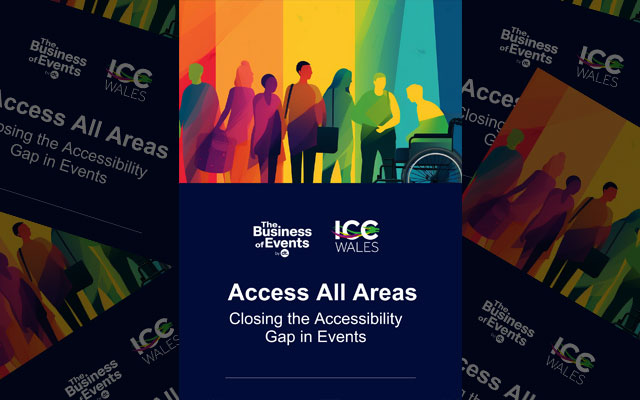
Ninety-three per cent of disabled delegates continue to encounter barriers when attending events, according to landmark research by The Business of Events and ICC Wales, supported by the All-Party Parliamentary Group for Events.
Launched at IBTM World on November 19, the report – Access All Areas: Closing the Accessibility Gap in Events exposes a striking disparity between how venues perceive their accessibility provision and how delegates truly experience it.

Drawing on insights from 1,000 delegates who have attended an event within the last six months, the research discovered that nearly one in three identified as having a visible or non-visible disability, and of those, 93% reported encountering barriers to participation.
These included inaccessible layouts (28%); lack of accessible toilets (24%); untrained staff (25%); overstimulating environments (27%); and missing accessibility information (17%).
Over 100 venues were also surveyed. While 82% said they provide step-free access, 91% reported having accessible toilets, and 75% claimed their staff have disability awareness training, the findings suggest a disconnect between venue confidence and delegate experience. More than half (57%) of venues said they have a formal accessibility or inclusion policy in place.
However, cost remains a major point of contention. Nearly half (46%) of venues admitted they sometimes charge for accessibility adjustments such as gender-neutral toilets or ramped stages – a practice delegates overwhelmingly reject as discriminatory. Attendees regard accessibility as a fundamental right not an optional, paid-for extra.
Developed with the support of accessibility consultant Shani Dhanda, the research explores 12 themes, including policies and legislation, physical access, sensory needs, communication, training, and technology. Each reveals consistent pattern: while venues often report confidence in their measures, delegates continue to face barriers limiting full participation. After each disconnect is explained, Dhanda provides recommendations for bridging the accessibility gap.
Dhanda said: “The findings call for bold, lasting change. The time for quick fixes and reactive adjustments is over. Accessibility must be woven into every stage of design and delivery…”
The report also sets out 10 clear industry recommendations and a pathway to compliance with the European Accessibility Act, which came into force in June 2025.
“This report reinforces the urgency for collective action across the sector. True progress means moving beyond compliance and cost discussions, and towards a shared responsibility to make every event accessible by default,” said Craig Bingham, managing director, ICC Wales.
Access All Areas: Closing the Accessibility Gap in Events is available for download here.





















